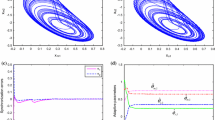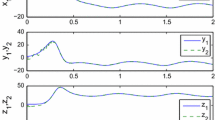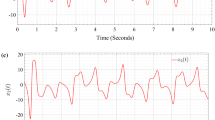Abstract
This paper presents a function approximation technique based immersion and invariance adaptive controller for chaos synchronization between nonidentical systems with unknown dynamics. In the proposed control scheme, the control system is reconstructed as the combination of a controllable linear system and a variation term from the original system. The variation term is treated as time-varying uncertainty and approximated by a group of weighted chosen basis functions. The immersion and invariance methodology is employed to design the adaptive control law such that both the synchronization error and uncertainty estimation error converge to zero. Two typical chaos synchronization problems are used in numerical simulations to verify the effectiveness and superiority of the proposed controller.
Similar content being viewed by others
References
L. M. Pecora and T. L. Carroll. “Synchronization in chaotic systems,” Physical Review Letters, vol. 64, no. 8, pp 821, February 1990.
S. Song, X. Song, N. Pathak, and I. T. Balsera. “Multi-switching adaptive synchronization of two fractional-order chaotic systems with different structure and different order,” International Journal of Control, Automation and Systems, vol. 15, no. 4, pp. 1524–1535, August 2017.
M. Liu, H. Chen, and S. Zhang. “H∞ synchronization of two different discrete-time chaotic systems via a unified model,” International Journal of Control, Automation and Systems, vol 13, no. 1, pp. 212–221, February 2015.
Y. Wang, X. Zhang, L. Yang, and H. Huang. “Adaptive synchronization of time delay chaotic systems with uncertain and unknown parameters via aperiodically intermittent control,” International Journal of Control, Automation and Systems, vol. 18, no. 3, pp. 696–707, March 2020.
X. Chen, J. H. Park, J. Cao, and J. Qiu. “Sliding mode synchronization of multiple chaotic systems with uncertainties and disturbances,” Applied Mathematics and Computation, vol. 308, pp. 161–173, September 2017.
P. Bagheri, M. Shahrokhi, and H. Salarieh. “Adaptive observer-based synchronization of two non-identical chaotic systems with unknown parameters,” Journal of Vibration and Control, vol. 23, no. 3, pp. 389–399, April 2015.
R. Rakkiyappan, R. Sivasamy, and X. Li. “Synchronization of identical and nonidentical memristor-based chaotic systems via active backstepping control technique,” Circuits, Systems, and Signal Processing, vol. 34, no. 3, pp. 763–778, March 2015.
Y. Wang, S. Li, D. Wang, F. Ju, B. Chen, and H. Wu. “Adaptive time-delay control for cable-driven manipulators with enhanced nonsingular fast terminal sliding mode,” IEEE Trans. on Industrial Electronics, vol. 68, no. 3, pp. 2356–2367, 2021.
Y. Wang, L. Liu, D. Wang, F. Ju, and B. Chen. “Time-delay control using a novel nonlinear adaptive law for accurate trajectory tracking of cable-driven robots,” IEEE Trans. on Industrial Informatics, vol. 16, no. 8, pp. 5234–5243, August 2020.
Y. Wang, K. Zhu, B. Chen, and M. Jin. “Model-free continuous nonsingular fast terminal sliding mode control for cable-driven manipulators,” ISA Transactions, vol. 98, pp. 483–495, March 2020.
Y. Wang, B. Li, F. Yan, and B. Chen. “Practical adaptive fractional-order nonsingular terminal sliding mode control for a cable-driven manipulator,” International Journal of Robust and Nonlinear Control, vol. 29, no. 5, pp. 1396–1417, February 2019.
S. Yang, C. Li, and T. Huang. “Impulsive synchronization for TS fuzzy model of memristor-based chaotic systems with parameter mismatches,” International Journal of Control, Automation and Systems, vol. 14, no. 3, pp. 854–864, June 2016.
C. H. Kao, C. F. Hsu, C. H. Wang, and H. S. Don. “Chaos synchronization using adaptive dynamic neural network controller with variable learning rates,” Mathematical Problems in Engineering, vol. 2011, Article ID 701671, 2011.
A. Izadbakhsh, P. Kheirkhahan, and S. Khorashadizadeh. “FAT-based robust adaptive control of electrically driven robots in interaction with environment,” Robotica, vol. 37, no. 5, pp. 779–800, May 2019.
Y. Liang, S. Cong, and W. Shang. “Function approximation-based sliding mode adaptive control,” Nonlinear Dynamics, vol. 54, no. 3, pp. 223–230, January 2008.
Y. Bai, M. Svinin, and M. Yamamoto. “Adaptive trajectory tracking control for the ball-pendulum system with time-varying uncertainties,” Proc. of IEEE/RSJ International Conference on Intelligent Robots and Systems (IROS), pp. 2083–2090, 2017.
P. C. Chen and A. C. Huang. “Adaptive sliding control of non-autonomous active suspension systems with time-varying loadings,” Journal of Sound and Vibration, vol. 282, no. 3–5, pp. 1119–1135, April 2005.
Y. Bai, M. Svinin, E. Magid, and Y. Wang. “On motion planning and control for partially differentially flat systems,” Robotica, vol. 39, no. 4, pp. 718–734, 2021.
Y. Bai, M. Svinin, Y. Wang, and E. Magid. “Function approximation technique based control for a class of nonholonomic systems,” Proc. of IEEE/SICE International Symposium on System Integration, Honolulu, USA, pp. 283–288, January 2020.
S. M. Ahmadi and M. M. Fateh. “Robust control of electrically driven robots using adaptive uncertainty estimation,” Computers & Electrical Engineering, vol. 56, pp. 674–687, November 2016.
M. M. Zirkohi and T. Kumbasar. “Adaptive backstepping controller design for MIMO cancer immunotherapy using Laguerre polynomials,” Journal of Franklin Institute, vol. 357, no. 8, pp. 4664–4679, May 2020.
A. C. Huang and Y. S. Kuo. “Sliding control of nonlinear systems containing time-varying uncertainties with unknown bounds,” International Journal of Control, vol. 74, no. 3, pp. 252–264, January 2001.
L. Sonneveldt, E. V. Oort, Q. Chu, and J. Mulder. “Immersion and invariance based nonlinear adaptive flight control,” Proc. of AIAA Guidance, Navigation, and Control Conference, pp. 7690, 2010.
A. Astolfi and R. Ortega. “Immersion and invariance: A new tool for stabilization and adaptive control of nonlinear systems,” IEEE Trans. on Automatic Control, vol. 48, no. 3, pp. 590–606, April 2003.
J. J. Yan, M. L. Hung, and T. L. Liao. “Adaptive sliding mode control for synchronization of chaotic gyros with fully unknown parameters,” Journal of Sound and Vibration, vol. 298, no. 1–2, pp. 298–306, November 2006.
J. Hu, S. Chen, and L. Chen. “Adaptive control for anti-synchronization of chua’s chaotic system,” Physics Letters A, vol. 339, no. 6, pp. 455–460, May 2005.
H. K. Chen. “Global chaos synchronization of new chaotic systems via nonlinear control,” Chaos, Solitons & Fractals, vol. 23, no. 4, pp. 1245–1251, February 2005.
S. H. Hosseinnia, R. Ghaderi, A. Ranjbar, M. Mahmoudian, and S. Momani. “Sliding mode synchronization of an uncertain fractional order chaotic system,” Computers & Mathematics with Applications, vol. 59, no. 5, pp. 1637–1643, March 2010.
M. Siddique and M. Rehan. “A concept of coupled chaotic synchronous observers for nonlinear and adaptive observers-based chaos synchronization,” Nonlinear Dynamics, vol. 84, no. 4, pp. 2251–2272, June 2016.
A. C. Huang and Y. C. Chen. “Adaptive multiple-surface sliding control for non-autonomous systems with mismatched uncertainties,” Automatica, vol. 40, no. 11, pp. 1939–1945, November 2004.
D. Ebeigbe, T. Nguyen, H. Richter, and D. Simon. “Robust regressor-free control of rigid robots using function approximations,” IEEE Trans. on Control Systems Technology, vol. 28, no. 4, pp. 1433–1446, 2020.
Y. Liu, Q. Zeng, S. Tong, C. L. P. Chen, and L. Liu. “Adaptive neural network control for active suspension systems with time-varying vertical displacement and speed constraints,” IEEE Trans. on Industrial Electronics, vol. 66, no. 12, pp. 9458–9466, December 2019.
A. Izadbakhsh and S. Khorashadizadeh. “Robust adaptive control of robot manipulators using Bernstein polynomials as universal approximator,” International Journal of Robust and Nonlinear Control, vol. 30, no. 7, pp. 2719–2735, May 2020.
Z. Reza and S. Khorashadizadeh. “Direct adaptive modelfree control of a class of uncertain nonlinear systems using Legendre polynomials,” Transactions of the Institute of Measurement and Control, vol. 41, no. 11, pp. 3081–3091, January 2019.
G. Zhu, S. Wang, L. Sun, W. Ge, and X. Zhang. “Output feedback adaptive dynamic surface sliding-mode control for quadrotor UAVs with tracking error constraints,” Complexity, vol. 2020, Article ID 8537198, 2020.
G. Zhu, L. Nie, Z. Lv, L. Sun, X. Zhang, and C. Wang. “Adaptive fuzzy dynamic surface sliding mode control of large-scale power systems with prescribe output tracking performance,” ISA Transactions, vol. 99, pp. 305–321, April 2020.
X. Zhang, X. Chen, G. Zhu, and C.Y. Su. “Output feedback adaptive motion control and its experimental verification for time-delay nonlinear systems with asymmetric hysteresis,” IEEE Trans. on Industrial Electronics, vol. 67, no. 8, pp. 6824–6834, September 2019.
A. C. Huang and M. C. Chien, Adaptive Control of Robot Manipulators: A Unified Regressor-free Approach, World scientific, 2010.
M. M. Zirkohi. “Direct adaptive function approximation techniques based control of robot manipulators,” Journal of Dynamic Systems, Measurement, and Control, vol. 140, no. 1, pp. 011006, 2018.
M. R. Shokoohinia and M. M. Fateh. “Robust dynamic sliding mode control of robot manipulators using the Fourier series expansion,” Transactions of the Institute of Measurement and Control, vol. 41, no. 9, pp. 2488–2495, October 2018.
Y. Bai, Y. Wang, M. Svinin, E. Magid, and R. Sun. “Function approximation technique based immersion and invariance control for unknown nonlinear systems,” IEEE Control Systems Letters, vol. 4, no. 4, pp. 934–939, October 2020.
K. Khorashadizadeh and M. M. Fateh. “Uncertainty estimation in robust tracking control of robot manipulators using the Fourier series expansion,” Robotica, vol. 35, no. 2, pp. 310–336, February 2017.
G. Wang, C. Wang, Y. Yan, L. Li, and X. Cai. “Distributed adaptive output feedback tracking control for a class of uncertain nonlinear multi-agent systems,” International Journal of Systems Science, vol. 49, no. 3, pp. 587–603, 2017.
A. C. Huang and Y. C. Chen. “Adaptive sliding control for single-link flexible-joint robot with mismatched uncertainties,” IEEE Trans. on Control Systems Technology, vol. 12, no. 5, pp. 770–775, August 2004.
P. A. Ioannou and J. Sun, Robust Adaptive Control, Courier Corporation, 2012.
R. Kamalapurkar, J. A. Rosenfeld, A. Parikh, A. R. Teel, and W.-E. Dixon. “Invariance-like results for nonautonomous switched systems,” IEEE Trans. Automatic Control, vol. 64, no. 3, pp. 614–627, February 2018.
B. Paden and S. Sastry. “A calculus for computing Filippov’s differential inclusion with application to the variable structure control of robot manipulators,” IEEE Trans. Circuits and Systems, vol. 34, no. 1, pp. 73–82, January 1987.
C. C. Yang and C. J. Ou. “Adaptive terminal sliding mode control subject to input nonlinearity for synchronization of chaotic gyros,” Communications in Nonlinear Science and Numerical Simulation, vol. 18, no. 3, pp. 682–691, March 2013.
X. Wu, Z. H. Guan, Z. Wu, and T. Li. “Chaos synchronization between Chen system and Genesio system,” Physics Letters A, vol. 364, no. 6, pp. 484–487, May 2017.
R. Cheng, A. Verma, G. Orosz, S. Chaudhuri, Y. Yue, and J. Burdick. “Control regularization for reduced variance reinforcement learning,” Proc. of International Conference on Machine Learning, Long Beach, USA, pp. 1141–1150, June 2019.
T. Silver, K. Allen, J. Tenenbaum, and L. Kaelbling. “Residual policy learning,” arXiv preprint arXiv:1812.06298, 2018.
Author information
Authors and Affiliations
Corresponding author
Additional information
Publisher’s Note Springer Nature remains neutral with regard to jurisdictional claims in published maps and institutional affiliations.
Yujie Wang received his B.S. degree from Nanjing University of Science and Technology in 2016. Currently, he is pursuing an M.S. degree at University of Illinois Urbana-Champaign. His research interests include robust control, adaptive control, and reinforcement learning.
Yang Bai received his B.S., M.S., and Ph.D. degrees in mechanical engineering from Kyushu University, Fukuoka, Japan, in 2014, 2016, and 2019, respectively. He has been an assistant professor at the College of Information Science and Engineering, Ritsumeikan University, since 2019. Dr. Bai is a member of the Institute of Electrical and Electronic Engineers (IEEE) and the Robotics Society of Japan (RSJ). His current research interests include robust adaptive control and multi-agent control.
Mikhail Svinin received his Ph.D. degree from St. Petersburg Informatics and Automation Institute, St. Petersburg, Russia, and conducted postdoctoral studies at the Institute of Automatic Control, Darmstadt Technical University, Germany, as an Alexander von Humboldt Research Fellow, and at Tohoku University, Japan, as a JSPS post-doctoral fellow. Before joining the College of Information Science and Engineering, Ritsumeikan University, he was with the Department of Mechanical Engineering, Kyushu University. His research interests include robotics, control theory, and analytical mechanics. Dr. Svinin is a member of the Institute of Electrical and Electronic Engineers (IEEE) and the Robotics Society of Japan (RSJ). He received best paper awards at the IEEE/RSJ International Conference on Intelligent Robots and Systems, IROS 2008, and the JSME International Conference on Advanced Mechatronics, 2004.
Rights and permissions
About this article
Cite this article
Wang, Y., Bai, Y. & Svinin, M. Function Approximation Technique Based Adaptive Control for Chaos Synchronization between Different Systems with Unknown Dynamics. Int. J. Control Autom. Syst. 19, 2611–2621 (2021). https://doi.org/10.1007/s12555-020-0412-y
Received:
Revised:
Accepted:
Published:
Issue Date:
DOI: https://doi.org/10.1007/s12555-020-0412-y




